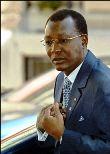Darfur rebel JEM and Chad agree to cooperate
Sept 25, 2005 (ABUJA) — A rebel movement in Sudan’s Darfur region and the government of neighbouring Chad have agreed to cooperate, removing an obstacle that has hindered progress at Darfur peace talks.
 The Justice and Equality Movement (JEM) had for months accused Chad of being a “peace-spoiler” and complained about Chad’s role as a mediator in the talks between the Sudanese government and Darfur rebels taking place in Nigeria.
The Justice and Equality Movement (JEM) had for months accused Chad of being a “peace-spoiler” and complained about Chad’s role as a mediator in the talks between the Sudanese government and Darfur rebels taking place in Nigeria.
The African Union (AU), which is mediating, said on Sunday a JEM delegation met Chad’s President Idriss Deby in N’Djamena to dispel misunderstandings and the JEM had accepted Chad as a co-mediator in the peace process.
The AU said the two sides had agreed “to closely cooperate with the international community to find a speedy and durable solution to the humanitarian crisis facing the people of Darfur”.
Chad is embroiled in the Darfur conflict because the rebellion in the vast desert region of western Sudan has forced about 200,000 refugees into remote eastern Chad.
N’Djamena says the crisis has cost it tens of millions of dollars, created a security problem and damaged the environment.
The JEM, the smaller of two armed groups that rebelled against Khartoum in early 2003, has accused Chad of supporting some rebel factions over others, playing into the hands of the Sudanese government.
Chad countered that it had no interest in prolonging the conflict and the rebels were looking for reasons to avoid making tough commitments to achieve peace.
The wrangling was one of the problems that have plagued peace talks in the Nigerian capital Abuja, now in their sixth round. A wider problem is disunity within the JEM and inside the Sudan Liberation Army (SLA), the larger rebel movement.
The SLA and the JEM took up arms over what they saw as Khartoum’s preferential treatment of Arab tribes in Darfur and neglect of non-Arabs. The rebels say the government responded by backing militias that drove non-Arabs from their villages.
The ensuing campaign of violence, arson and rape caused tens of thousands of deaths and drove about 2 million people from their homes into refugee camps, mostly inside Darfur. The United States called the killings in Darfur “genocide”.
The AU has 3,000 troops in Darfur monitoring a ceasefire that has been repeatedly violated, with the government and the rebels blaming each other.
The sixth round of talks started with a week of workshops during which the parties discussed power sharing, wealth sharing and security arrangements. Detailed discussion of these issues was due to begin on Monday.
(Reuters)
